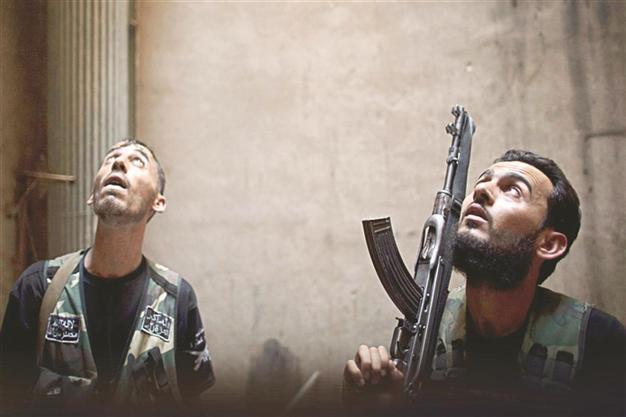Syrian rebels use sarin gas, Russia asserts
UNITED NATIONS

Rebel fighters look up listening as they take positions during clashes with pro-government forces in the Salaheddine district of Aleppo. Russia’s UN Ambassador Churkin has blamed rebels to made and used sarin gas in the Khan al-Assal attack. AFP photo
Russia’s U.N. ambassador said July 9 that Russian experts determined that Syrian rebels made sarin nerve gas and used it in a deadly chemical weapon attack outside Aleppo in March.
Ambassador Vitaly Churkin blamed opposition fighters for the March 19 attack in the government-controlled Aleppo suburb of Khan al-Assal, which he said killed 26 people, including 16 military personnel, and injured 86 others.
The rebels have blamed the government for the attack. The U.S. Britain and France have said they have seen no evidence to indicate that the opposition has acquired or used chemical weapons.
Churkin told reporters after delivering an 80-page report to Secretary-General Ban Ki-moon that the Syrian regime asked Russia, its closest ally, to investigate the attack after a U.N. team of chemical weapons experts was unable to enter the country in a dispute over the probe’s scope.
The samples taken from the impact site of the gas-laden projectile were analyzed at a Russian laboratory certified by the Organization for the Prohibition of Chemical Weapons, Churkin said. He said the analysis showed that the unguided Basha’ir-3 rocket that hit Khan al-Assal was not a military-standard chemical weapon. The United States rejected Russian claims. “We have yet to see any evidence that backs up the assertion that anybody besides the Syrian government has the ability to use chemical weapons, (or) has used chemical weapons,” White House spokesman Jay Carney said.
Possibly ‘recent production’Churkin said the results indicate it “was not industrially manufactured and was filled with sarin.” He added the samples indicated the sarin and the projectile were produced in makeshift “cottage industry” conditions, and the projectile “is not a standard one for chemical use.”
The absence of chemical stabilizers, which are needed for long-term storage and later use, indicated its “possibly recent production,” Churkin said. “Therefore, there is every reason to believe that it was the armed opposition fighters who used the chemical weapons in Khan al-Assal,” he added.
“According to information at our disposal,” he noted, “the production of ‘Basha’ir 3’ unguided projectiles was started in February 2013 by the so-called ‘Basha’ir al-Nasr’ brigade affiliated with the Free Syrian Army.”
Churkin said Russia plans to provide the report to the U.S., U.K. and France, and “I hope they find it persuasive.” But he said it will not be made public.
On July 8, Syria invited Ake Sellstrom, head of the U.N. fact-finding mission on allegations of chemical weapons use in Syria, and U.N. disarmament chief Angela Kane to visit Damascus for foreign-minister level talks on conducting a probe of just the Khan al-Assal attack.
Britain, France and the United States have provided the secretary-general with information on other alleged chemical weapons attacks in Syria. Ban has repeatedly said he wants a broader investigation than just Khan al-Assal.
